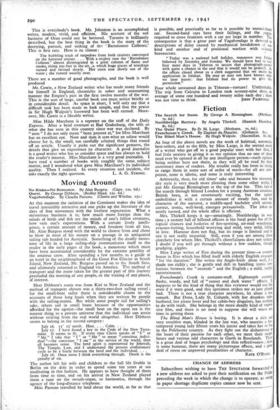Fiction
The Search for Susie. By George A. Birmingham. (Methuen 7s. 6d.) As four of the above novels are the work of habitual, automatic best-sellers, and as the fifth, by Miss Large, is the second novel of a writer who got off to a good popular start with her first, I feel little anxiety in giving it as my opinion that no one of them need ever be opened at all by any intelligent person—such opinion being neither here nor there, as they will all be read by their customary mass of readers. My trouble really has been in trying to range them in some sort of order of merit—for all are com- petent, none is idiotic, and none is truly interesting.
Arbitrarily, then, for old times' sake and because his seasoned, dry style is very much more pleasing than some other styles, I put Mr. George Birmingham at the top of the list. This tale of the search through blitzed London for a young Austrian countess. British born, is not enormously exciting, but the author embellishes it with a certain amount of steady fun, and the character of the narrator, a middle-aged bachelor civil servant, correct, ironic, well-bred, emerges persuasively. The jokes are neatly turned, and the whole affair is efficient.
Mrs. Thirkell keeps it up—amazingly. Northbridge in war- time ; a rectory full of billeted officers is the focal point for all the topical chances and fooleries of fire-spotting, air-raid wardening. evacuee-baiting, household worrying and mild, very mild, falling in love. Humour does not flag, but its range is limited and its eye is not really impartial. Still, even if you are among those crotchety few whom Mrs. Thirkell's cheerfulness does not seduce. I doubt if you will get through without a few sudden, though grudging, giggles.
Miss Large writes of Eire during the present time—a county house in Eire which has filled itself with elderly English evacuees " for the duration." She writes the Anglo-Irish diom well, if a shade too richly ; she is gentle and deft in handling ironic con- fusions between the " neutrals " and the English ; a mild, tactful entertainment.
Frenchman's Creek is costume-stuff. Eighteenth century, flashy, wordy, and full of " sunset and dark water " effects. It happens to be the kind of thing that this reviewer would not like even if it were good, and this specimen strikes me as just plumb bad. There is not a true character anywhere, let alone a true remark. But Dona, Lady St. Columb, with her drunken rake- husband, her pirate lover and her cabin-boy disguises, has nothing to do with truth. She belongs in the more- deadly kind of Men' sive film, and there is no need to suppose she will waste anY time in getting there.
The Blind Man's House is boring. It is about a rich and very sensitive man, blinded in the last war, who marries a hot- tempered young lady fifteen years his junior and takes her to live in the Polchester country. As they fight out the disharmony at the heart of their passion for each other, we meet their neigh- bours and various odd characters in Garth in Roselands. The is a great deal of bogus psychology and thin reflectiveness ; there is some humour, there are many picturesque effects, and a great deal of stress on unproved peculiarities of character.
KATE O'BRIEN.


























 Previous page
Previous page